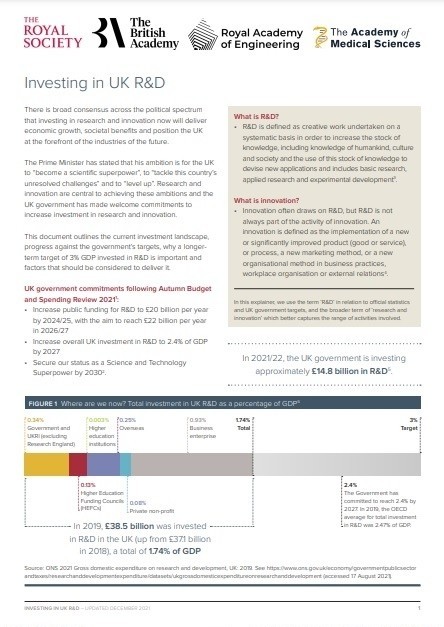The Academy was instrumental in founding the UK's main health research regulator.
We are committed to facilitating a proportionate and streamlined system for the regulation and governance of health research. Ahead of the UK general election in 2010 we raised serious concerns that the UK regulatory environment was actually hampering research for patient benefit. As a result, the Government commissioned the Academy to undertake a comprehensive review of UK health research regulation. Based on over 300 written evidence submissions, we laid out a regulatory overhaul to widespread support from researchers, funders and patients.
Our review led to the establishment of the Health Research Authority (HRA) in primary legislation, streamlining regulatory processes that had previously delayed research. In 2022 the HRA celebrated its 10th anniversary.

The Academy has continued to champion a proportionate approach to the regulation and governance of health research in areas such as clinical trials and medical devices, and to highlight where regulation aimed at preventing the misuse of drugs is hampering research into treatments for unmet need.
“The Academy leads the way in bringing key players together, allowing different sectors to identify areas of common concern and to find a way to fix problems. The introduction of a better regulatory framework for health research has been a major boost to UK science and would not have happened without the hard work of the Academy.” Sir David Cooksey GBE FMedSci, Founding Chairman of The Francis Crick Institute
The Academy of Medical Sciences works in various ways, including with partner organisations, to ensure government spending advances UK biomedical and health research:
Budgets and Spending Reviews
We submit detailed evidence to government Budgets and Spending Reviews, setting out principles and policy recommendations to guide UK Government investment in medical research. You can read our recent submissions here:
Consultations
We convene Academy Fellows to submit to one-off consultations, from government or parliament, that relate to government spending on biomedical and health research. Explore all our recent consultation responses in our publications section.
Letters and joint statements
To complement our evidence-based submissions, our President may write to leading government and parliamentary stakeholders to emphasise key points and ensure the views of biomedical and health research, and importantly the needs of patients and the public, are heard. Read some of our recent letters here and find all our letters in our publications section.
Explainers and briefings
As part of our evidence-based approach to policy, we work with partners to develop ‘explainers’ or briefings on key topics, setting out the vital information needed to inform policy around biomedical and health research in the UK. You can read some recent briefings here and find all our explainers in our publications section.
There is broad consensus across the political spectrum to increase combined public and private investment in UK research and development (R&D).
The Government has committed to investing £22 billion in R&D by 2026-27 as part of a target of 2.4% of GDP by 2027, and 3% in the longer-term. A wide-ranging R&D roadmap has been published to help shape and deliver this agenda.
To deliver this, the UK needs to foster research and innovation throughout public services, universities and businesses, and attract global investment, incentivising companies to locate their R&D here. Only by doing this will we enable research and innovation to help improve the health and wealth of the country.
We have worked with the Royal Society, the British Academy and the Royal Academy of Engineering to outline the investment landscape, why £22 billion and the longer-term 3% target is important and factors that should be considered to deliver it.
We work in partnership to provide evidence of the benefits of investing in research and innovation.
We jointly funded a series of evaluations of economic return from medical research. We found:

This series of work started in 2006 with a report on assessing the benefits of medical research to society. We continued in 2008 with a focus on economic and societal benefits of research into cardiovascular diseases and mental health and again in 2014 examining the value of investment into research on cancer. This concluded with a 2018 study on the return on public and charitable investment in research into musculoskeletal conditions. Our President commented:
“Funding research into these conditions not only delivers direct health benefits to patients, it is also hugely beneficial to the UK economy, helping to lay the foundations for a healthier, wealthier future... investing in biomedical research delivers an annual return of about 25 pence per pound in perpetuity, offering an indisputable economic benefit. This new figure ably illustrates why scientific research has earnt its place at the heart of a modern industrial strategy.”
In addition, we recognised the need to better understand the range of benefits that R&D brings to the UK and how those benefits are distributed. We worked with the other UK National Academies to produce two evidence syntheses to build this evidence base: looking at the distribution of R&D benefits and the conditions needed to translate research and drive innovation across creative industries, defence, fintech and life sciences.
UKRI
Delivering the government's planned increases in R&D investment will need significant increases in investment from both public and private sources. UKRI delivers the majority of public funding for research and innovation in the UK and will play a central role in realising the government’s ambition. We have collaborated with the other UK National Academies to write an explainer summarising UKRI’s structure, governance and operation to support discussion over how this funding is distributed.
ARIA
On 19 February 2021, the UK Government announced the creation of a new body to fund high-risk and potentially high-reward research: the Advanced Research & Invention Agency (ARIA). The Academy welcomes the addition of ARIA to the research ecosystem.


